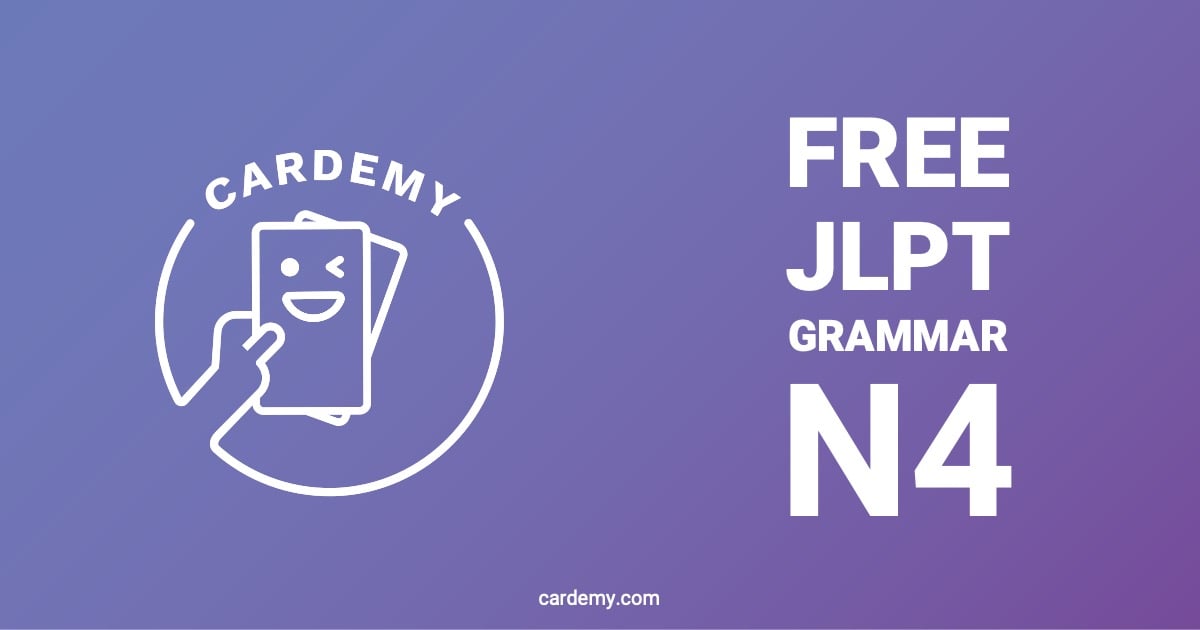There are 4 different forms of conditionals in Japanese: the conditionals to, ba, tara and nara.
| Conditionnel |
S1
|
S2
|
|---|---|---|
|
と
|
この 薬を 飲むと
|
治るだろう。
|
|
ば
|
この 薬を 飲めば
|
治るだろう。
|
|
たら
|
この 薬を 飲んだら
|
治るだろう。
|
|
なら
|
この 薬を 飲むなら
|
治るだろう。
|
All these conditionals have a similar meaning which can be roughly translated as:
If you take this medicine, you will surely get well (S2 occurs if S1).
If you take this medicine, you will surely get well (S2 occurs if S1).
The と(to) conditional
The と conditional allows to express a natural consequence that is almost always true.
Conjugations :
Verbs are conjugated like this : [verb base form] + と
飲むと (if I drink)
飲むと (if I drink)
雨が 降ると (if it rains)
食べると (if I eat)
i adjectives : [i-adjective] + と
汚いと (if it's dirty)
Nouns and na-adjectives : [na-adjective or noun] + だと
雨だと (if it's raining)
Examples with verbs :
If you take this medicine, you will get better.
雨が 降ると、 雪が溶けます
When the rain falls, the snow melts.
四月になると、桜が咲きます。
When we will be in April, the cherry trees will be in flower.
Examples with i-adjectives :

成績が 悪いと、落第します。
If his grades are bad, he will fail.
美味しいと、嬉しいです。
I will be happy if it is delicious.
汚いと、父は怒ります。
My father gets angry when it's dirty.
Examples with nouns and na-adjectives :
教室が きれいだと、 先生は喜びます。
My teacher is happy if the classroom is clean.
部屋が 静かだと、 生徒達は落ち着きます。
When the room is quiet, students are calmed.
この 部屋は、 先生だと入ることができる。
You may enter this room if you are a teacher.
The ば (ba) conditional
ば conjugation for the verbs :
1) 一段動詞 / verbes in -ru : Base + れば
Affirmative:
食べる : Base 食べ → 食べれば
見る : Base 見 → 見れば
Negative:
Base + なければ
食べる : Base 食べ → 食べなければ
見る : Base 見る → 見なければ
Affirmative:
食べる : Base 食べ → 食べれば
見る : Base 見 → 見れば
Negative:
Base + なければ
食べる : Base 食べ → 食べなければ
見る : Base 見る → 見なければ
2) 五段動詞 / verbes en -u : Base + e ば
Affirmative:
乗る noru : Base nor → 乗れば noreba
待つ matsu : Base mat → 待てば mateba
書く kaku : Base kak → 書けば kakeba
話す hanasu : Base hanas → 話せば hanaseba
遊ぶ asobu : Base asob → 遊べば asobeba
読む yomu : Base yom → 読めば yomeba
泳ぐ oyogu : Base oyog → 泳げば oyogeba
Negative:
Base + a なければ
乗る noru : Base nor → 乗らなければ noranakereba
待つ matsu : Base mat → 待たなければ matanakereba
書く kaku : Base kak → 書かなければ kakanakereba
Affirmative:
乗る noru : Base nor → 乗れば noreba
待つ matsu : Base mat → 待てば mateba
書く kaku : Base kak → 書けば kakeba
話す hanasu : Base hanas → 話せば hanaseba
遊ぶ asobu : Base asob → 遊べば asobeba
読む yomu : Base yom → 読めば yomeba
泳ぐ oyogu : Base oyog → 泳げば oyogeba
Negative:
Base + a なければ
乗る noru : Base nor → 乗らなければ noranakereba
待つ matsu : Base mat → 待たなければ matanakereba
書く kaku : Base kak → 書かなければ kakanakereba
3) 不規則動詞 / irregular verbs:
する → affirmative すれば, negative しなければ
くる → negative くれば , negative こなければ
する → affirmative すれば, negative しなければ
くる → negative くれば , negative こなければ
この薬を飲めば、治るだろう。
If you take this medicine, you will get better.
雨が降れば、中止です。
If it rains, the event will be cancelled.
先生が来れば、始ます。
If a teacher comes, we start.
先生が来なければ、中止です。
If a teacher doesn't come, we cancel.
ば conditional conjugation of i-advectives
Affirmative :
Replace い by ければ
よい → よければ
よい → よければ
Negative :
Replace くない by くなければ
よくない → よくなければ
寒ければ、外に出ません。
If it's cold outside, we don't go out.
寒くなければ、外に行きます。
If it's not cold outside, I go out.
長ければ、切ります。
If it's long, we cut.
長くなければ、切りません。
If it's not long, we won't cut.
安ければ、買います。
If it's cheap, I'll buy it.
Exercices
Conjugate the of the i-word adjectives below to the ば form (ければ / くなければ)
楽しい
Answer →
楽しければ
Translation →
If it is fun.
悲しい (negative)
Answer →
悲しくなければ
Translation →
If it is not sad.
辛い
Answer →
辛ければ
Translation →
If it's painful.
Conjugate the words below in the ば form.
飲む
Answer →
飲めば
Translation →
If he drinks.
聞く (negative)
Answer →
聞かなければ
Translation →
If he doesn't hear.
走る
Answer →
走れば
Translation →
If he runs.
明い
Answer →
明ければ
Translation →
If it's bright.
高い (negative)
Answer →
高くなければ
Translation →
If it's not expensive / high.
面白い
Answer →
面白ければ
Translation →
If it's interesting.
The たら (tara) conditional
The たら conditional is often used in spoken language.
It expresses the relationship between assumptions and their consequences by emphasizing an idea of sequence.
S2 is triggered once S1 comes true.
S1 : この薬を 飲んだら、 S2 : 治るだろう。
The たら form is made from the past form of adjectives :
S2 is triggered once S1 comes true.
S1 : この薬を 飲んだら、 S2 : 治るだろう。
The たら form is made from the past form of adjectives :
[Past form affirmative or negative] + ら
Affirmative:
帰った + ら → 帰ったら
見た + ら→ 見たら
寝た + ら → 寝たら
読んだ + ら → 読んだら
選んだ + ら → 選んだら
Negative:
帰らなかった + ら → 帰らなかったら
見なかった + ら → 見なかったら
寝なかった + ら → 寝なかったら
読まなかった + ら → 読まなかったら
選ばなかった + ら → 選ばなかったら
お 酒を 飲んだら、眠くなりますよ。
If you drink alcohol, you will be sleepy.
お 酒を 飲まなかったら、運転できます。
If you don't drink alcohol, you can drive.
今夜よく寝たら、 明日は元気になると思う。
If I sleep well tonight, I think I'll be fine tomorrow.
今夜よく寝なかったら、 明日は疲れると思う。
If I don't sleep well tonight, I think I'll be tired tomorrow.
たら conjugation of i-adjectives:
[Affirmative or negative past form] + ら
Affirmative:
暑かった + ら → 暑かったら
寒かった + ら → 寒かったら
静だった + ら → 静だったら
有名だった + ら → 有名だったら
元気だった + ら → 元気だったら
Negative:
暑くなかった + ら → 暑くなかったら
寒くなかった + ら → 寒くなかったら
静じゃなかった + ら → 静じゃなかったら
有名じゃなかった + ら → 有名じゃなかったら
元気じゃなかった + ら → 元気じゃなかったら
Affirmative:
暑かった + ら → 暑かったら
寒かった + ら → 寒かったら
静だった + ら → 静だったら
有名だった + ら → 有名だったら
元気だった + ら → 元気だったら
Negative:
暑くなかった + ら → 暑くなかったら
寒くなかった + ら → 寒くなかったら
静じゃなかった + ら → 静じゃなかったら
有名じゃなかった + ら → 有名じゃなかったら
元気じゃなかった + ら → 元気じゃなかったら
暑かったら、 水を 飲みます。
If it is hot, we drink water.
寒かったら、 帰るね。
If it's cold, I'll go inside.
静かじゃなかったら、 帰ります。
If it's not quiet, I'll go home.
たら conditional form of nouns :
Affirmative:
Affirmative:
[Nom] + だったら
これだったら
Negative :
[Nom] +じゃなかったら
それじゃなかったら
それじゃなかったら
力士だったら、 全部 食べます。
If he is a sumo wrestler, he will eat everything.
先生だったら、 わかる。
If he is the teacher, he'll understand.
Exercises
Conjugate the words below in the たら form.
飲む
Answer →
飲んだら
Translation →
If he drinks.
書く (negative)
Answer →
書かなかったら
Translation →
If he doesn't write.
泳ぐ
Answer →
泳いだら
Translation →
If he swims.
きれい
Answer →
きれいだったら
Translation →
If it is beautiful.
難しい (negative)
Answer →
難しくなかったら
Translation →
If it is not difficult.
遠い
Answer →
遠かったら
Translation →
If it is far.
The なら (nara) conditional
The なら conditional is suitable for describing the speaker's judgment, hope or will.
The probability of realization is lower compared to the others.
S1 : この薬を 飲むなら、 S2 : 治るだろう。
The conditional なら is formed from the base form conjugation of the verbs, i/na adjectives and nouns to which we just add なら.
きれい+なら → きれいなら
The probability of realization is lower compared to the others.
S1 : この薬を 飲むなら、 S2 : 治るだろう。
The conditional なら is formed from the base form conjugation of the verbs, i/na adjectives and nouns to which we just add なら.
きれい+なら → きれいなら
雨が降るなら、 傘が 必要です。
If it rains, we will need an umbrella.
魚を食べるなら、 白ワインがいいです。
If you eat fish, white wine will be fine.
元気なら、電話してよ。
If you are ever well, please call me.
To further emphasize the conditional, it is possible to add もし to the beginning of the sentence.
もしこの薬を 飲むなら、治るだろう。
もしこの薬を 飲むなら、治るだろう。
If you drink this medicine, you will be cured.
We can also use もしも to express that the event has very little chance of happening
もしもこの薬を 飲むなら、治るだろう。
If you ever drink this medicine, you will be cured.




Leave Comment